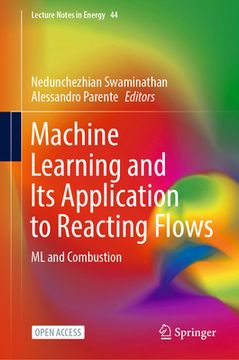Share
Machine Learning and Its Application to Reacting Flows: ML and Combustion (in English)
Swaminathan, Nedunchezhian ; Parente, Alessandro (Author)
·
Springer
· Hardcover
Machine Learning and Its Application to Reacting Flows: ML and Combustion (in English) - Swaminathan, Nedunchezhian ; Parente, Alessandro
$ 56.83
$ 59.99
You save: $ 3.16
Choose the list to add your product or create one New List
✓ Product added successfully to the Wishlist.
Go to My WishlistsIt will be shipped from our warehouse between
Tuesday, June 11 and
Wednesday, June 12.
You will receive it anywhere in United States between 1 and 3 business days after shipment.
Synopsis "Machine Learning and Its Application to Reacting Flows: ML and Combustion (in English)"
This open access book introduces and explains machine learning (ML) algorithms and techniques developed for statistical inferences on a complex process or system and their applications to simulations of chemically reacting turbulent flows.These two fields, ML and turbulent combustion, have large body of work and knowledge on their own, and this book brings them together and explain the complexities and challenges involved in applying ML techniques to simulate and study reacting flows. This is important as to the world's total primary energy supply (TPES), since more than 90% of this supply is through combustion technologies and the non-negligible effects of combustion on environment. Although alternative technologies based on renewable energies are coming up, their shares for the TPES is are less than 5% currently and one needs a complete paradigm shift to replace combustion sources. Whether this is practical or not is entirely a different question, and an answer to this question depends on the respondent. However, a pragmatic analysis suggests that the combustion share to TPES is likely to be more than 70% even by 2070. Hence, it will be prudent to take advantage of ML techniques to improve combustion sciences and technologies so that efficient and "greener" combustion systems that are friendlier to the environment can be designed. The book covers the current state of the art in these two topics and outlines the challenges involved, merits and drawbacks of using ML for turbulent combustion simulations including avenues which can be explored to overcome the challenges. The required mathematical equations and backgrounds are discussed with ample references for readers to find further detail if they wish. This book is unique since there is not any book with similar coverage of topics, ranging from big data analysis and machine learning algorithm to their applications for combustion science and system design for energy generation.
- 0% (0)
- 0% (0)
- 0% (0)
- 0% (0)
- 0% (0)
All books in our catalog are Original.
The book is written in English.
The binding of this edition is Hardcover.
✓ Producto agregado correctamente al carro, Ir a Pagar.

